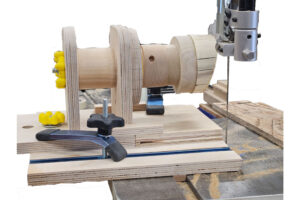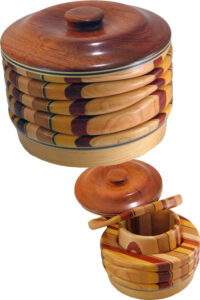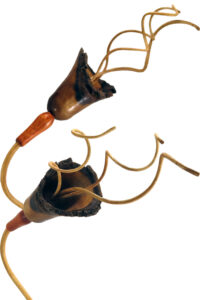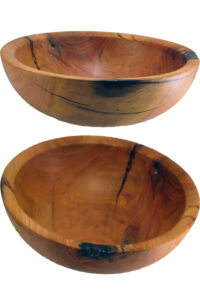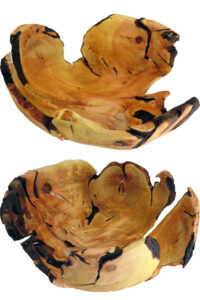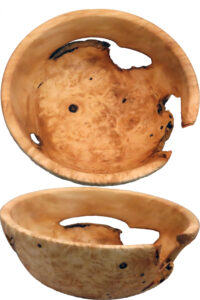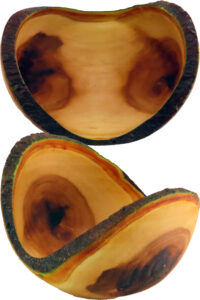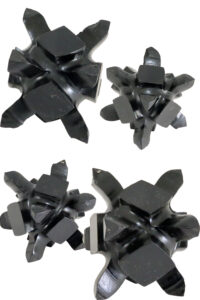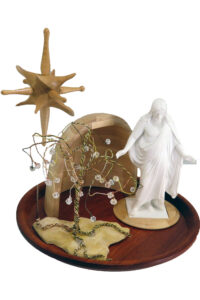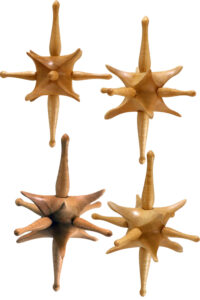Woodturner’s Band Saw Sled – Essential for Advanced Projects
In the remote possibility of technical difficulties, this post is also available at YouTube and FaceBook.
Best Right Here!
While making last week’s project, it was an appropriate time to upgrade my band saw sled incorporating inspiration from a demonstration at last year’s Rocky Mountain Symposium in Colorado.
In that demonstration, he used a sled that had some features that I thought would be good to incorporate into the sled I have been using and upgrading for several years. One problem – these features depended on a salvaged lathe spindle. The spindle provided a threaded mount and length for stability. My previous sled used a 3D printed knob that held a chuck or threaed faceplate to a 3/4″ plywood.
Then the idea hit. I had also designed and 3D printed a chuck hub that could serve a similar purpose. And, in fact, would be even better and much less expensive.
My new design will cut arc’, sloped cuts, straight cuts, and freehand cuts. For each cut the turning project is mounted to a chuck or threaded faceplate. Then, with the sled, it can be safely cut. This design also enables exact offset cuts by using a spacer inserted behind the plywood base holding the chuck hub. Therefore, all other settings are preserved – no dismantling required for the offset.
Projects that follow John Beaver require offset curve cuts. My Celtic knot vases require offset slant cuts at specific rotations.
Dimensions depend on the bandsaw capacity. I share my dimensions and their rationale in the video. Please adapt to your equipment. Please also share your enhancements.
Chuck hubs and knobs that match popular spindle sizes are available at by Etsy store at
https://www.etsy.com/shop/AsWoodTurnsTools
Universal T-Track hardware, I purchased from HomeDepot.com.
Enjoy.
p.s. If you would like a more in depth demonstration than my weekly videos, please contact me for an IRD (Zoom Demo) on this or other topics.
A Child’s Stacking Toy Grows Up – Now My Fancy Wood Box
Please view this post here on this page. However, if there are technical difficulties, it is also posted on YouTube and FaceBook.
A viewer, Steve, sent me a set of pictures and asked how to turn it. I had to scratch my head and recall presentations by Janice Levy and others. Then figure out how to cut an inner box out from the center of a larger box.
First conclusion. Don’t cut it out of the same block – well, almost. But first elongate the lamination so that the plies are identical. Then turn the two stacks to fit together as if they had be cut apart.
Second project. What is the order of operations? How to I mount the wood to do what is required. This led to a secondary question – How to switch mounting from one end to the other end to proceed.
While at it, I souped up by band saw sled to safely make the cuts. Well, I had previous band saw sleds for Celtic knots and straight cuts. This one did not require precision like those, but still needed to be safe while cutting a freehand curve. While I was at it, I found that the sled could also cut a smooth curve like John Beaver uses for his works.
Woods: Walnut, yellowheart, wenge, maple, cherry, bloodwood, and dyed veneer.
Finish: wipe-on poly
Size: about 6 diameter and 5 tall.
Enjoy.
Peach Bowl To Preserve Precious Memories
This is not the best example of wood for bowl turning. However, it was essential to turn this bowl anyway as a return gift to the lady in whose yard this tree grew. I filled the major cracks with ultra violet activated resin which I am finding very convenient for small repairs. It is supposed to be longer lasting than CA glue.
The completed bowl will be returned to the lady to preserve her memories associated with her family and this peach tree.
The bowl is nine inches diameter and three inches high, finished with wipe-only poly.
Enjoy.
Rose Bowl From The Root
This video post is best viewed here on this page. However, if you have technical difficulties, it is also posted on YouTube and FaceBook.
After digging up an old rose bush from my yard, I attempt to turn the root ball to get a bowl.
At 8″ by 3″, this bowl warped dramatically making it too warped to finish turning and sanding it on the lathe. Still, I carved and sanded it before finishing with walnut oil.
It is unique.
Enjoy.
Rejected, Discarded But Beautiful Burl Bowl
This video is best viewed right here on this page. However, if you are experiencing technical difficulties, it is also posted on YouTube and FaceBook. Please return here.
This cottonwood was discarded at our club’s monthly Saturday gathering. Why discarded? The piece had a pair of smaller burl bumps. One had an accidental gash from a chain saw; the other had large obvious voids.
I picked it up anyway and decided to see if I could get anything from it. It yielded a 6″ diameter, 2″ tall bowl with amazing burl figure. Walnut oil brings out the beautiful color.
Enjoy.
Turning – My Quest For A Wood Star
Please view this video here. However, if there are difficulties, it is also posted on YouTube and FaceBook.
After turning an eight point star inspired a few weeks ago, I had a another thought about how to turn a star yet another way. I was not sure it could be successful. However, I decided to try.
Previously I have:
- Turned a sphere and added finials;
- Turned a cube into a star using a specific, custom jig;
- Turned a cube into a star using a pen mandrel centered on faces, then adding finials;
- Turned a cube into a star using a pen mandrel centered on faces but with much deeper coves, then adding finials;
- And now, turn a cube into a star using the corners of the cube. Could I add finials???
I am now wondering where else my star quest can go.
Here are the previous videos
Turning Multi Axis Eight Point Star With Jig
Turning 8 Point 3 Axis Star Ornament – No Jig Required
Turning 8 Point 3 Axis Star – Best Yet
Link to Drive Centers
https://www.printables.com/model/824088-drive-centers-or-hubs-for-woodturning-8-point-star
What do you think about the differences in the process? Which do you prefer?
Enjoy.
Turning Finishing Touches To My Easter Diorama
This video is best viewed here on this page. If you are having technical difficulties, please try YouTube or FaceBook.
This project is the culmination of several projects. It is a diorama with a theme of Jesus Christ’s resurrection. It consists of a tray, a star, a tomb, a wire tree, and a miniature statue of Jesus Christ.
This video details the tomb, a segmented project with eight segment rings with segment counts from six to twenty segments. The variance in segments enables aligning joints at each half ring. Then by aligning this joint from ring to ring, it can be sawn in half and have a full segment on each half bowl. Recently, for an oval bowl, the half bowls were glued together to form an oval bowl. The tomb represents the empty tomb after the resurrection. The wood is maple. This is an evolution of previous video titled “Turning Oval Bowl With Basic Tools – Segmented (Or Solid)“
The miniature statue of Jesus Christ is a replica of the Christus by Danish sculpturor, Bertel Thorvaldsen. This is available at Amazon and other stores.
The wire tree consists of 27 strands of 22 gauge brass wire with five different finishes. The wire is wrapped together to form the tree and root system. As the limbs branch out, the wire count is reduced. At the end of each wire, a clear bead is attached. The tree is mounted to a piece of carved wood for stability. Wire from Amazon
The tray is bloodwood as shown in the project titled “Turning My Tray (Not A Platter??)“. The choice of bloodwood was appropriate since Jesus Christ’s blood was shed for us.
The star is maple as shown in the project titled “Turning 8 Point 3 Axis Star – Best Yet“. The star represents the celestial star which signaled His birth.
The complete diorama will be displayed in an Easter exhibit.
Enjoy.
Turning 8 Point 3 Axis Star – Best Yet
This video post is best viewed here on this page. However, in case of technical difficulty, it is also available on YouTube and FaceBook.
A few weeks ago, I turned an eight point star inspired by an ornament submitted in last year’s Ornament Challenge. From comments, I learned that I did not turn it exactly as they had but close enough.
However, I wanted a star with more pointed rays. So, I am taking the concept a bit further by cutting a deeper cove at each mount. I wanted to see if this would work also.
Did it work?
Here are the previous videos:
- Turning Multi Axis Eight Point Star With Jig
- Turning 8 Point 3 Axis Star Ornament – No Jig Required
What do you think about the differences in the process? Which do you prefer?
Enjoy!
